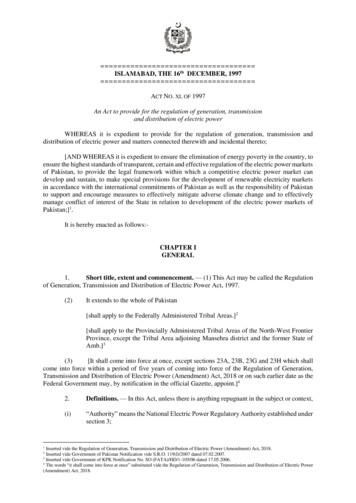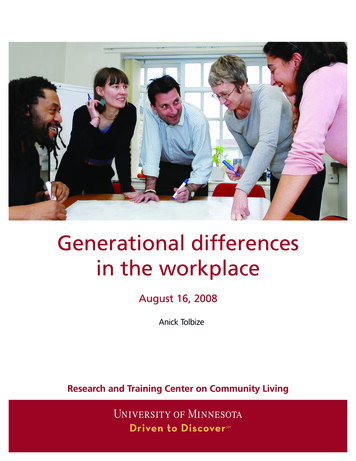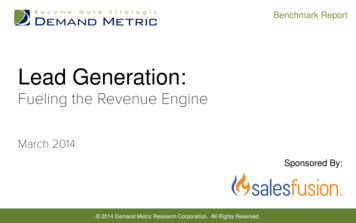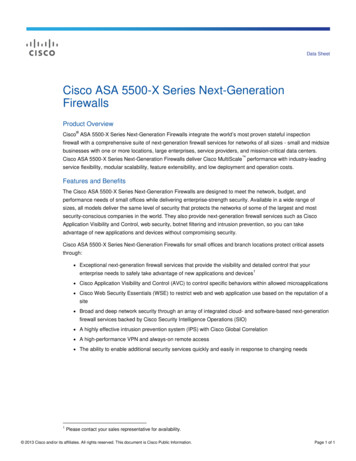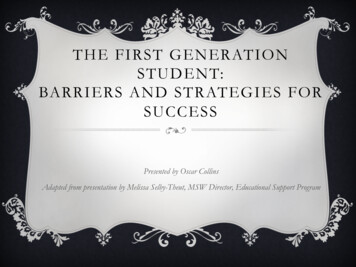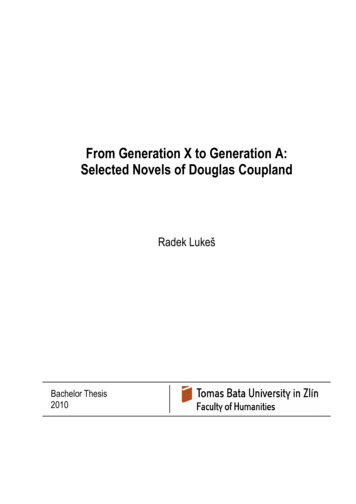
Transcription
From Generation X to Generation A:Selected Novels of Douglas CouplandRadek LukešBachelor Thesis2010
ABSTRAKTTato práce analyzuje zobrazení americké konzumní společnosti v románech DouglaseCouplanda Generation X: Tales for an Accelerated Culture (1991), Microserfs (1995) aGeneration A (2009). Práce se zabývá problematikou dvou generací a rozdíly mezi nimi,dále hledá alternativy jako nosné téma Couplandových románů. Práce dochází k závěru, žeobě generace se od sebe nijak výrazně neliší a mladí dospělí se potýkají se stejnýmiproblémy.Klíčová slova: Douglas Coupland, Generace X, Generace A, Microserfs, marketing,konzumní společnost, Amerika, informační technologie, mladí dospělíABSTRACTThis thesis analyses the portrayal of the American consumer society in Douglas Coupland’snovels Generation X: Tales for an Accelerated Culture (1991), Microserfs (1995) andGeneration A (2009). It also deals with the problems of two generations and the differencesbetween them, it further looks for alternatives as a main theme of Coupland’s novels. Thethesis concludes that the generations do not differ too much and young adults stand up tothe same problems.Keywords: Douglas Coupland, Generation X, Generace A, Microserfs, marketing,consumer society, America, information technologies, young adults
ACKNOWLEDGEMENTSI owe special thanks to Mgr. Roman Trušník, Ph.D., the advisor of my bachelor thesis, forhis patience, the help he provided me with and his willingness to work with me.
CONTENTSINTRODUCTION . 91WHAT DEFINES A GENERATION . 112BOOMERS VS BUSTERS . 123GENERATION X . 144MICROSERFS. 285GENERATION A . 34CONCLUSION . 38BIBLIOGRAPHY. 40
TBU in Zlín, Faculty of Humanities9INTRODUCTIONThe Canadian writer Douglas Coupland, born in Germany, is famous for his satiricalfiction that belongs to contemporary culture. He is also recognized for his visual art anddesign. His first book was published in 1991. Coupland’s novels and non-fiction bookswere translated into more than 30 languages around the world.1 In his work he deals mainlywith “twentysomethings”2 and his stories are considered to be critical of that time.Despite being Canadian, Coupland’s work is usually about American young adults andtheir lifestyle. His first novel Generation X: Tales for an Accelerated Culture (1991),which dealt with twentysomethings, characters representing the new generation in a “stateof anomie,”3 rejecting the consumerism and society of that time, being part of so called“culture of semi-disposable Swedish furniture, fast food and designer labels.”4 RichardGray remarks that Coupland “is acknowledging, however wryly or bleakly, his implicationin a culture where, as the narrator of Generation X puts it, ‘genuine capital H history’ hasended, ‘turned into a press release, a marketing strategy’.”5 Richard Gray wanted to pointout the problems of our characters that they actually have no existence. They are constantlyliving in the presence of mass media. So they have quit their careers in order to row againstthe stream. Working at “McJob,”6 drinking heavily they are telling stories. Another novelby Coupland is Microserfs from 1995 which could almost be the flipside to the GenerationX. Microserfs deals with a group of geeks who give up on “having a life” to work. This istotally opposite to what members of Generation X, simply “GenXers”7 have done they gaveup work to “have a life.” It is obvious that Microserfs is much more positive and itscharacters full of energy.Up to now the latest work by Douglas Coupland is Generation A (2009), which ismore than similar to Generation X, using the same style and structure which is also aframed narrative. Taking place in a near future, we read short stories from five different1See Douglas Coupland, “Biography,” http://www.coupland.com/category/bio/Vann Wesson, Generation X Field Guide & Lexicon (New York: Orion Books, 1996), 174.3See Richard Gray, A History of American Literature (Maldem: Blackwell, 2004), 758.4See Gray, A History of American Literature, 758.5See Gray, A History of American Literature, 758.6Wesson, Generation X Field Guide & Lexicon, 110.7Douglas Rushkoff, GenX Reader (New York: Ballantine Books, 1994), 4.2
TBU in Zlín, Faculty of Humanities10individuals, who were brought to a same place, after they were stung by a bee, who werethought to be extinct.The purpose of this thesis is to illustrate the generations, their problems and look forsome alternatives as a main theme according to the novels. It also seems that DouglasCoupland was ahead of the game when he predicted some future events.
TBU in Zlín, Faculty of Humanities111WHAT DEFINES A GENERATIONIt is suspicious to give some “generational labels”8 to certain population during the certainperiod of time. The fact is that people born a few decades ago had different values,different expectations. They did things which might look ridiculous for contemporarysociety. That is for sure a part of human nature. But who comes up with those labels, thatwe can talk about “Generation This and That?”9 Obviously, it is historians and sociologist,who give those labels. While speaking about groups of people in history, they need theselabels to identify them, give them some kind of identity. All this is quite understandable.When we talk about Generation X we talk about people born between 1961–1981.10 Buthow can we talk about the same people when someone is born before the War in Vietnamand someone after? Actually, they did not grow up in the same world. According to Straussand Howe the authors of the book called 13th Gen: Abort, Retry, Ignore, Fail?, to talkabout a particular generation we have to understand that it takes around eighteen to twentyfour years, average is twenty-one years. This is what defines a generation’s time span, timewhich is needed for that generation to reproduce and get the next generation started.11 Still,this is not the answer. Another important feature defining the generations is characterizedby the “peer personality”12 theory. We might say it is connected with huge historicalevents. People in each generation share something common, to talk about their experiencesor the way they looked at different aspects of life,13 we have to understand that “BabyBoomers”14 (the generation that preceded Generation X) might understand for example theVietnam War from a different perspective, put it into a different context. William Straussand Neil Howe interpret the peer personality as the main feature that defines thegenerations.158Wesson, Generation X Field Guide & Lexicon, 37.Wesson, Generation X Field Guide & Lexicon, 37.10See Howe, Neil, and Bill Strauss. 13th Gen: Abort, Retry, Ignore, Fail? (New York: Vintage, 1993), 13.11See Wesson, Generation X Field Guide & Lexicon, 41.12Wesson, Generation X Field Guide & Lexicon, 41.13See Wesson, Generation X Field Guide & Lexicon, 41.14Wesson, Generation X Field Guide & Lexicon, 10.15See Wesson, Generation X Field Guide & Lexicon, 41.9
TBU in Zlín, Faculty of Humanities212BOOMERS VS BUSTERSTo start talking about Generation X, we must understand what in fact preceded thisparticular generation. It was a generation called Baby Boomers. “Those 78 millionAmericans born between 1943 and 1960.”16 Generation known for “questioning andchallenging the establishment.”17 It was the generation of huge expectations, anything waspossible for them. And you have to give them that right to think of themselves like theydid. After overcoming the Great Depression and winning the Second World War, theUnited States together with Russia became the world leading powers with bright future forits coming generations. We might even talk about the American Dream again, which wasuneasy to reach during those difficult times in American history. It was Boomers whostarted to think about this phenomenon again. “Everyone imagined that they could get thestandard package for the American Dream: B.A. degree, good job, nice houses, andfamily.”18 But this myth stayed elusive for most of the 78 million Americans which belongto this group of people.Generation X means a lot of things. It could refer to the name of Billy Idol’s band. Butwe face a generation characterized by the lack of specific identity, consuming society.Term itself was popularized by Douglas Coupland.19 Generation X – “eighty million youngmen and women, they make up the biggest generation in American history.”20 Like theprevious generations they also faced economic, political and ecological environment,representing a wide variety of lifestyles and beliefs. The generation which is not afraid ofthe digital future. Nintendo, Atari, Cable TV, all this was already present and not unknownfor these people. It may surprise some people that they were considered as “too cynical,lazy and always seeking fun,”21 it seems like they did not take their lives seriously.Sometimes you may find definition like: “segment of America’s youth too young toremember the assassination of President Kennedy and too old to have missed the end ofdisco.”22 They witnessed their parents’ hippie riotous life and their later transformation to16Wesson, Generation X Field Guide & Lexicon, 10.Wesson, Generation X Field Guide & Lexicon, 10.18Wesson, Generation X Field Guide & Lexicon, 73.19See Wesson, Generation X Field Guide & Lexicon, 76.20Howe, Neil, and Strauss, 13th Gen, 7.21Wesson, Generation X Field Guide & Lexicon, 1.22Rushkoff, GenX Reader, 3.17
TBU in Zlín, Faculty of Humanities13“Yuppies.”23 “Running on financial credit and social debit,”24 they had the feeling that afterthe boomer population they are going to struggle, having in mind that the Medicare and theSocial Security depend on them it was their burden, the burden of so called “babybusters.”25 The generation that is unlikely to match their parents’ fortunes.26Sociologists rather prefer the term “thirteenth generation,”27 the generationcharacteristic for lack of motivation, no career goals, no political ideology, no familyvalues. Twentysomethings are dependant on their parents’ money, as they are not willing towork at McJobs for the rest of their lives. In addition to this, boomers were getting olderlooking forward to their social benefits which as it appears will depend on those youngadults, spending their time in a mall, eating in McDonalds and permanently watchingMTV. The reason why sociologists call these eighty millions Americans the 13thgeneration is maybe due to the fact that it stands for something negative, it is somethingpeople can argue about. The number thirteen might evoke something bad, everybodyknows about Friday the Thirteenth, number considered as unlucky. There are much moreelucidations about this term. “It’s the floor where elevators do not stop, the doughnutbakers do not bother to count. Counting back to the peers of Benjamin Franklin, thisgeneration is, in point of fact, the thirteenth to know the American nation, flag, andConstitution.”2823Wesson, Generation X Field Guide & Lexicon, 188.Rushkoff, GenX Reader, 3.25Wesson, Generation X Field Guide & Lexicon 12.26Rushkoff, GenX Reader, 3.27Rushkoff, GenX Reader, 3.28Howe, Neil, and Strauss, 13th Gen, 16.24
TBU in Zlín, Faculty of Humanities314GENERATION XThe main characters of Coupland’s first novel are Dag, Claire and Andy. They are part ofthe society they hate. Educated but underemployed, they face the consumerist society.Instead of trying harder in their lives, they somehow lose hope, unable to cope with thesituation. Generation X: Tales for an Accelerated Culture is the story of three disaffectedchildren of the eighties who cannot live up to conventional society’s expectations.29Working at low-paying, unpopular McJobs, the term invented by Douglas Coupland, isno real fun for young adults of these time. Disgusted with their jobs they simply do notwant to work for companies operating in service sector, providing services. McJob isdefined as “a low pay, low prestige, low dignity, low benefit, no-future job in the servicesector.”30 It is no surprise that these “slackers”31 rebel against the Puritan/Protestant workethic, the pride of the United States of America. As described in Generation X Field Guideand Lexicon, a slacker is “a rebel against the Puritan work ethic. A generic term for onewho does not attempt to live up to society’s expectations.”32 With a lack of motivation,they just lay back and wait for “it” to happen to them. With the idea that they have to “liveand work at McJob wages to pay Social Security”33 for Boomers, it would be difficult foreveryone, it is definitely not an easy task.They meet in California desert, living next to each other in their small bungalows theyare part of “the poverty jet set.”34 The term described as “a group of people given tochronic traveling at the expenses of long-term job stability or a permanent residence.”35They work at McJob positions; Dag and Andy together as bartenders in a local pub andClaire works as a cashier for the Chanel. Everything looks appalling for them and as theythink of their lives they “wonder that all things seem to be from hell these days: dates, jobs,parties,weather.”36 So there they are, in California desert, namely in Palm Spring, and asAndy says one cold night sitting on a terrace: “We know that this is why the three of us leftour lives behind us and came to the desert – to tell stories and to make our own lives29See Jason Cohen and Michael Krugman, Generation Ecch!: The Backlash Starts Here (New York:Fireside, 1994), 112.30Wesson, Generation X Field Guide & Lexicon, 110.31Wesson, Generation X Field Guide & Lexicon, 150.32Wesson, Generation X Field Guide & Lexicon, 150.33Wesson, Generation X Field Guide & Lexicon, 111.34Douglas Coupland, Generation X: Tales for an Accelerated Culture (London: Abacus, 1996), 5.35Coupland, Generation X, 7.
TBU in Zlín, Faculty of Humanities15worthwhile tales in the process.”37 They tell those “bedtime stories”38 to each other unableto criticize at the end because this is the only way they feel safe, having problems to revealtheir emotions. It seems that these problems result from “the absence of mother love whichturns out to be the root cause of their troubles.”39The escape from home is a big issue of these days. The problem is that they arerunning away, but the reason is not to stand on their own feet, it is more likely an escapefrom “unbearable situation at home”40 Not everyone comes from a wealthy family and hasno problems with their parents. Almost every teenager goes through this stage, when theydo not agree with their parents no matter what. Some of their runaways might have beeninspired by Huckleberry Finn “who took off and paddled his way down the Mississippi,along the way growing from a boy into a man and learning how to love and respect otherswho might be different.”41 Maybe they are looking for a frontier, the truth is that mobilityis very important for American society, it is one of the key features of their identity. Theymove a lot, usually because of a better job, elders move to some sunny places like Florida,just to spend the rest of their life with sun and nice weather.In the novel Andy leaves his home as a teenager at quite an early age to face the realworld. As he remembers: “I, in fact, have no memory of having once been hugged by aparental unit.”42 The lack of love shown by his family might have resulted in a fact that hehas never been in love. Obsessed by his skinny body he is coming from a big family andvery good during his studies of languages, when his specialty is Japanese, he leaves hisfamily to try to live on his own, to look for love of his life.43 As Andy says in one of thechapters: “I’ve never been in love, and that’s a problem. I just seem to end up as friendswith everyone, and I tell you, I really hate it. I want to fall in love. Or at least I think I do.I’m not sure. It looks so . messy.”44 Claire has a different story. One day she meets Andy36Coupland, Generation X, 8.Coupland, Generation X, 10.38Coupland, Generation X, 16.39Cohen and Krugman, Generation Ecch!, 113.40Geoffrey T. Holtz, Welcome to the Jungle: The Why Behind “Generation X” (New York: St. Martin’sGriffin, 1995), 92.41Holtz, Welcome to the Jungle, 92.42Coupland, Generation X, 155.43See Coupland, Generation X, 53.44Coupland, Generation X, 53.37
TBU in Zlín, Faculty of Humanities16in Palm Springs while he is “tending the poolside bar at La Spa de Luxembourg.”45 She ison a vacation with her family and Andy sees Claire sitting “profoundly unamused by herfamily’s spirited, italicized conversations.”46 She is totally fed up with her family. Sheneeds a serious conversation so she goes to the bar, where Andy is working that day andthe pair starts chatting. She tells him how disappointed she is, feeling that she is differentfrom other members of her family. As the conversation passes they feel friendliness, morethan that, but nothing happens. Andy asks her if she would not like to move to thebungalow next to him and later she agrees. Both of them want something different thanthey are offered till this moment.47 They want to live on their own, unhappy with their livesso far. The last character on the scene is Dag. Working in Toronto and having a job inadvertising he refuses to work in those “veal-fattening pens”48 and moves to Californiadesert to work at McJob with Andy.There they are, all of them living in Palm Springs together, ready to fight against allthe traps the life brings. The biggest problem for the characters is that “they don’t believein the American dream now.”49 Their anger is aimed at their parents as Dag vandalizes acar with a “bumper sticker saying WE’RE SPENDING OUR CHILDREN’SINHERITANCE.”50 They do not see any future, prosperity. “The only reason they’vedropped out from society is that the market is down.”51 Day by day working at McJobs foreight hours of monotonous work they come home with the feeling of “the endless stress ofpointless jobs done grudgingly to little applause.”52 It was their choice to live on themargins as Dag describes the reason why he quit the job he had in Toronto. “I wasn’t goingto produce much, and to be honest, I had decided that morning that it was very hard to seemyself doing the same job two years down the road.”53 It is understandable that peoplewant to improve, challenge themselves, but to quit a job when they are doing well does notmake much sense. As said before at the centre of attention for those threetwentysomethings are older people, previous generation and mainly yuppies, “young urban45Coupland, Generation X, 37.Coupland, Generation X, 38.47Coupland, Generation X, 42.48Coupland, Generation X, 23.49Cohen and Krugman, Generation Ecch!, 113.50Coupland, Generation X, 5.51Cohen and Krugman, Generation Ecch!, 113.52Coupland, Generation X, 14.46
TBU in Zlín, Faculty of Humanities17professionals with a taste for BMWs, Rolex watches, imported bottled water andfashionable restaurants.”54 They are still reminded by older generation of their failure. Thatnothing is good enough for them. “I just don’t understand you young people. No workplaceis ever okay enough. And you mope and complain about how uncreative your jobs are andhow you’re getting nowhere, and so when we finally give you a promotion you leave andgo pick grapes in Queensland or some other such nonsense,”55 as the boss of Dagcomments on his decision to quit the job. It seems that GenXers have the chance to livemuch better lives than they were living, it is only up to them. But for some reason they donot want to. Of course they want but they do not want to go for it when they have a chance,as teenagers they were used to have what they asked for and now they think that it willcome by itself without hard work, the problem is that it does not work like that in life.People have to try hard until they achieve something. They are annoyed and fed up with thesociety and their own situation, but instead of working harder they turn their anger towardsother people, as Dag accuses one of the richer guys in the novel saying: “You’d last aboutten minutes if you were my age these days.”56The main word which characterizes the Generation X is probably “decline andend.”57 As we may witness this bad turn in their social life we may also see the problems ineconomy which might have much bigger impact on their future, not only theirs, but alsofuture of their offspring. On every step, every corner, they can hear things like the end ofprogress, the end of equality. Beside this, even the end of the Cold War had a “bittersweettinge.”58 Of course, it was a great success thanks to a bad political situation which led to acollapse of the Soviet Union and as a result the United States of America became theabsolute world leading power. But it was not that positive as they might have thought,“beacuse for the life of us, no one in America today can get a handle on the big question,‘What next?’”59 “The twenties are supposed to be a time of widening horizons, of brightpossibilities. Instead, America seems to have entered an era of limits – or at least convinced53Coupland, Generation X, 23.Wesson, Generation X Field Guide & Lexicon, 188.55Coupland, Generation X, 25.56Coupland, Generation X, 26.57Eric Lui, “The End of Progress?” in GenX Reader, ed. Douglas Rushkoff (New York: Ballantine Books,1994), 73.58Eric Lui, “The End of Progress?” 73.59Eric Lui, “The End of Progress?” 73.54
TBU in Zlín, Faculty of Humanities18itself of that.”60 It is obvious that finding a job is an uneasy problem to be solved. Onemight disagree that the job opportunities are still up for grabs, that is true, but more or lessit is one of those unpopular McJobs. But it is not the end of the American Dream. It lookslike the capitalism is over, the system which made its name during the times of theIndustrial Revolution. We have to understand that progress is almost like a synonym to theUnited States.America as we know it exists only a few centuries, less than any other Europeancountry and still they have a rich history. The progress made from sixteenth century up tonow, to be one of the world leading powers, is simply admirable. Back to the point, it wasnot the end of the American Dream, as it is something what will never die, it wasimportant, still is and probably always will be. It is up to this generation to get back ontrack, get back to the materialistic American life. But the truth is that they face economiccrisis. “No generation should be asked to suffer the burden of the excesses of another.”61From the statement made by former President Bill Clinton we may see that Generation Xactually is supposed to suffer the burden:. Years of neglect have left America’s economy suffering from stagnant growth and decliningincomes . They have left a mountain of debt and a Federal Government that must borrow to paymore than a fifth of its current bills. Perhaps most sadly, they have left the great majority of peopleno longer dreaming about the American Dream. Our children’s generation may be the first to doworse than their parents.62Economy of the United States is the engine that drives American life, but with no engine asociety cannot progress. Furthermore, America is running out of gas.63 Two-thirds of newjobs created in 1992 are actually McJobs with hourly wages and no benefits. As a result,people live almost in poverty. But what is more deterrent is the fact that minimum wagehas 26 percent less purchasing power than two decades back. In a simplified way, peopleare working harder but are paid less. There was also a massive firing in the 1980s, aroundtwenty million workers lost their job just because employees went out of business or theywere simply fired.64 America’s economy of that time was in trouble, not a big one, butsooner the Americans realize the problem, the better for them. Workforce was60Eric Lui, ”The End of Progress?” 73.Rushkoff, GenX Reader, 77.62Rushkoff, GenX Reader, 77.63Rushkoff, GenX Reader, 77.64Rushkoff, GenX Reader, 78.61
TBU in Zlín, Faculty of Humanities19underproductive and children undereducated. The times of conspicuous consumption has tostop. The solution is in long-term investments in people, education and health care. Thiswill bring the return on investment. Society simply cannot consume more than it produce.Not for the whole time.The problem with Social Security system has to be also mentioned. Problem of thissystem is that it is unfair to “younger, less affluent and less numerous workers to supportan older, more affluent and larger segment of the population.”65 Generation X has absoluteright to complain about this fact, by the time they will need the money, it will not beavailable for them, “even the Social Security Administration says it may be broke by theyear 2020, and definitely by 2029,”66 there will not be much to pass around for slackers.“Another study conducted in 1994 for the youth political advocacy group revealed thatmore twentysomethings believed in UFOs than the idea that Social Security money will beintact when they retire.”67 The Social Security money will be available, but for boomers,not for Generation X. Reason why it is like this is more than obvious:Slackers pay a much larger portion of their paychecks toward Social Security than Boomers, butthey are the ones who are getting to use the hard-earned cash slackers are giving up. It is prettydiscouraging for a GenXer who earns 9 an hour (less than 20,000 a year, before deductions) torealize that he or she is helping fund the Social Security and Medicare of a retired couple who earn 50,000 a year and own a house with no mortgage.68The national debt of 1990s was a remarkable amount of money with the growing tendency,which is not taken seriously and will be constantly overlooked, this “budget deficits willhave a huge impact on your economic future – how much people will pay in taxes, thechances of getting a good job, owning their own home, or receiving good health care.”69For over two hundred years America was doing just fine, in terms of nationaleconomy, operating with their budget very carefully, in a responsible way, having deficitsonly in times of a war or a great depression, all this has come to an end in 1969, since thenthe curve of debt was raising and raising. A debt means a lot of interest payments, money65Rushkoff, GenX Reader, 81.Wesson, Generation X Field Guide & Lexicon, 185.67Wesson, Generation X Field Guide & Lexicon, 163.68Wesson, Generation X Field Guide & Lexicon, 187.69Rushkoff, GenX Reader, 83.66
TBU in Zlín, Faculty of Humanities20which could be spent in a much better way for more useful things like investments tohealth care, environmental issues or education.70I would like to concentrate now on American education and its problems. Fromsurveys made in the 1990s we know that almost no one under thirty ever reads a newspaperor watches the news. Someone might argue that Generation X is lazy. But there has to besomething young people care about. Maybe it is a problem of news, which, sometimes usethe information in its own way, sometimes it distracts people. Not every time theinformation used is relevant, working as a tool of politicians in their campaigns forexample.71 Among another explanation we might include problems with education onwhich I would like to focus now a little bit. It is definitely schools that should preparechildren for their future. Due to its changes in school curriculum, changes in schoolstructure and general attitude of society “National Commission on Excellence inEducation”72 released a report saying that “for the first time in the history of the UnitedStates, the educational skills of one generation will not surpass, will not equal, will noteven approach, those of their parents.”73“Public education in America has long been considered ‘the great equalizer,’ providinga level playing field for each child and enabling anyone, from the poorest to the mostwealthy, an opportunity to realize his potential. To this generation, however, it hasfunctioned in the role of ‘the great polarizer’.”74 The system which was based on itsavailability for almost everyone turned to something opposite. It was no longer consideredto be the great equalizer, it became the polarizer and the term itself says what students andtheir parents had to face. System based on money and inequality. The problem was thatstudents who wanted a good education had to pay. This is not a problem as it is the way itworks in many modern countries. It is rather problem if people can afford it.Opportunity to continue the studies after graduation from high school was there foreveryone, the situation and number of colleges was growing, but the advantage was on theBoomer’s side. “By 1974, 60 percent of Boomer high-school graduates were able to70See Rushkoff, GenX Reader, 83.See Rushkoff, GenX Reader, 100.72Holtz, Welcome to the Jungle, 106.73Holtz, Welcome to the Jungle, 106.74Holtz, Welcome to the Jungle, 106.71
TBU in Zlín, Faculty of Humanities21continue their education at the college level.”75 There was also an ambitious grantprograms where students could ask for a loan, programs which “were transforming thevision of college education for all into
Vietnam War from a different perspective, put it into a different context. William Strauss and Neil Howe interpret the peer personality as the main feature that defines the generations. 15 8 Wesson, Generation X Field Guide & Lexicon, 37. 9 Wesson, Generation X Field Guide & Lexicon, 37. 10 See Howe, Neil, and Bill Strauss.
